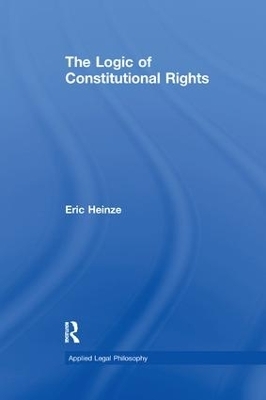
The Logic of Constitutional Rights
Seiten
2017
Routledge (Verlag)
978-1-138-25838-9 (ISBN)
Routledge (Verlag)
978-1-138-25838-9 (ISBN)
Individual rights raise endless conflicts and spawn intricate standards and policies. Increasing involvement by courts has added still greater complexity. In this book the author argues that a fixed structure underlies that complexity, determining the kinds of arguments that can be made about individual rights.
Individual rights raise endless conflicts and spawn intricate standards and policies. Increasing involvement by courts has added still greater complexity. It would seem that few meaningful principles can unite an area of law plagued by such uncertainty. In this book the author argues that a fixed structure underlies that complexity, determining the kinds of arguments that can be made about individual rights. Examples are drawn from the world's oldest and most intricate body of law on civil rights and liberties: the case law of the United States Supreme Court. Yet the model is designed to account for any legal system that recognizes civil rights and liberties. The author applies techniques of logical analysis (although no prior knowledge of logic is required) to identify a deeper discursive structure. He shows how simple concepts of harm and consent, which do not ordinarily appear to be relevant in all cases, provide unity within and across regimes of individual rights.
Individual rights raise endless conflicts and spawn intricate standards and policies. Increasing involvement by courts has added still greater complexity. It would seem that few meaningful principles can unite an area of law plagued by such uncertainty. In this book the author argues that a fixed structure underlies that complexity, determining the kinds of arguments that can be made about individual rights. Examples are drawn from the world's oldest and most intricate body of law on civil rights and liberties: the case law of the United States Supreme Court. Yet the model is designed to account for any legal system that recognizes civil rights and liberties. The author applies techniques of logical analysis (although no prior knowledge of logic is required) to identify a deeper discursive structure. He shows how simple concepts of harm and consent, which do not ordinarily appear to be relevant in all cases, provide unity within and across regimes of individual rights.
Dr Eric Heinze is Reader in Law at University of London, Queen Mary, where his areas of teaching and research include Jurisprudence and Legal Theory, International Human Rights and US Constitutional Law. His publications on the formal analysis of rights discourse include The Logic of Liberal Rights and The Logic of Equality. His publications on human rights also include Sexual Orientation: A Human Right. His current scholarship is examining critical currents in the history of legal theory, with a focus on Plato, Aristotle, Aquinas, Rousseau, Kant, Hegel, Marx and Heidegger.
Contents: Series preface; Introduction; Rights and restrictions; Agents; Harm; Consent; The background theories; Works cited; Index.
| Erscheinungsdatum | 08.04.2022 |
|---|---|
| Reihe/Serie | Applied Legal Philosophy |
| Verlagsort | London |
| Sprache | englisch |
| Maße | 156 x 234 mm |
| Gewicht | 453 g |
| Themenwelt | Recht / Steuern ► Allgemeines / Lexika |
| Recht / Steuern ► EU / Internationales Recht | |
| Recht / Steuern ► Öffentliches Recht ► Völkerrecht | |
| Sozialwissenschaften ► Soziologie ► Spezielle Soziologien | |
| ISBN-10 | 1-138-25838-5 / 1138258385 |
| ISBN-13 | 978-1-138-25838-9 / 9781138258389 |
| Zustand | Neuware |
| Haben Sie eine Frage zum Produkt? |
Mehr entdecken
aus dem Bereich
aus dem Bereich


